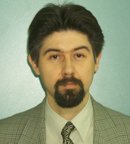Plenary Lecture
Investigating Problems of Modeling/Simulating the Behavior of Oil Spills in Marine Environment

Associate Professor Dimitris Sidiras
Laboratory of Simulation of Industrial Processes
Department of Industrial Management and Technology
University of Piraeus
Greece
E-mail: sidiras@unipi.gr
Abstract: Diesel and crude oil spills are common as offshore oil production and transport are continually increasing during the last decades. The significant impacts of these oil spills in the sea are largely mitigated by natural dispersion processes where wave action leads to the formation of micron-sized droplets that are eventually diluted to concentrations below toxic threshold limits. Since the application of dispersants is a common practice for decreasing the hazard for marine ecosystems, the behaviour of the formed solution is of critical importance when the diluted oil spill approaches the shoreline where the behaviour of shallow water mixture (usually in the form of colloid dispersion) is very complicated and sometime unpredictable. Moreover, the interaction of chemical dispersants and suspended sediments with diesel and crude oil influences the fate and transport of oil spills in coasts of touristic importance, with significant economic consequences, especially fro countries heavily depended on such activities. For investigating this behaviour and solving (at least partially) the relevant problems, we have simulated, in laboratory and pilot scale, seawater columns. These columns were used to study the effects of dispersants and other parameters on the formation and sedimentation of oil–dispersant-clay-aggregates in water and seawater (simulated and natural).
In an attempt to contribute in combating oil spill pollution, we have developed new adsorbents, which concentrate and transform liquid oil to the semi solid or solid phase, which can then be removed from the seawater. In general, they can be divided into three basic categories: inorganic mineral, organic synthetic and natural organic products like waste lignocellulosic biomass or agro-industrial by-products. The modification of lignocellulosic waste biomass can provide adsorbents with relatively high sorption capacity, biodegradability and cost-effectiveness for the adsorption of oil products. In our Laboratory we have simulated the modification process of straw and sawdust wastes to obtain low cost adsorbents for cleaning oil-products leakages forming complex solutions/colloids. We have also examined the effect of the modification on their oil spill adsorptivity to find out optimization conditions, according to technical/economic/environmental criteria.
Brief Biography of the Speaker: Assoc. Prof. D. Sidiras holds a 5-year diploma and a PhD in chemical engineering (1990) from the National and Technical University of Athens. He is teaching at the Department of Industrial Management and Technology of the University of Piraeus since 1999. He is teaching at the interdepartmental postgraduate courses (i) Systems of Energy Management and Protection of the Environment, running by the University of Piraeus in cooperation with the Chem. Eng. Dept. of the Nat. Tech. Univ. of Athens, and (ii) Techno-Economic Systems, running by the Electr. & Comp. Eng. Dept. of the Nat. Tech. Univ. of Athens in cooperation with the University of Athens and the University of Piraeus. His research interests include: experimental and computational simulation of industrial/chemical processes; economo-technical analysis of industrial branches/organic chemical industry; renewable energy sources; biomass; natural resources management; GIS based management; environmental management; manufacturing of agricultural product/byproducts; teaching methodology; distance learning.
Assoc. Prof. Sidiras has 17 publications in ISI journals, and 86 in conference proceedings (after peer-review), with 249 citations and an h-index of 9 (source: ISI Web of Science, Thompson Scientific; self-citations excluded). He participates continuously since 1989 in the European Biomass Conferences and published more than 31 papers in their proceedings, while recently he joined the conference’s scientific committee.